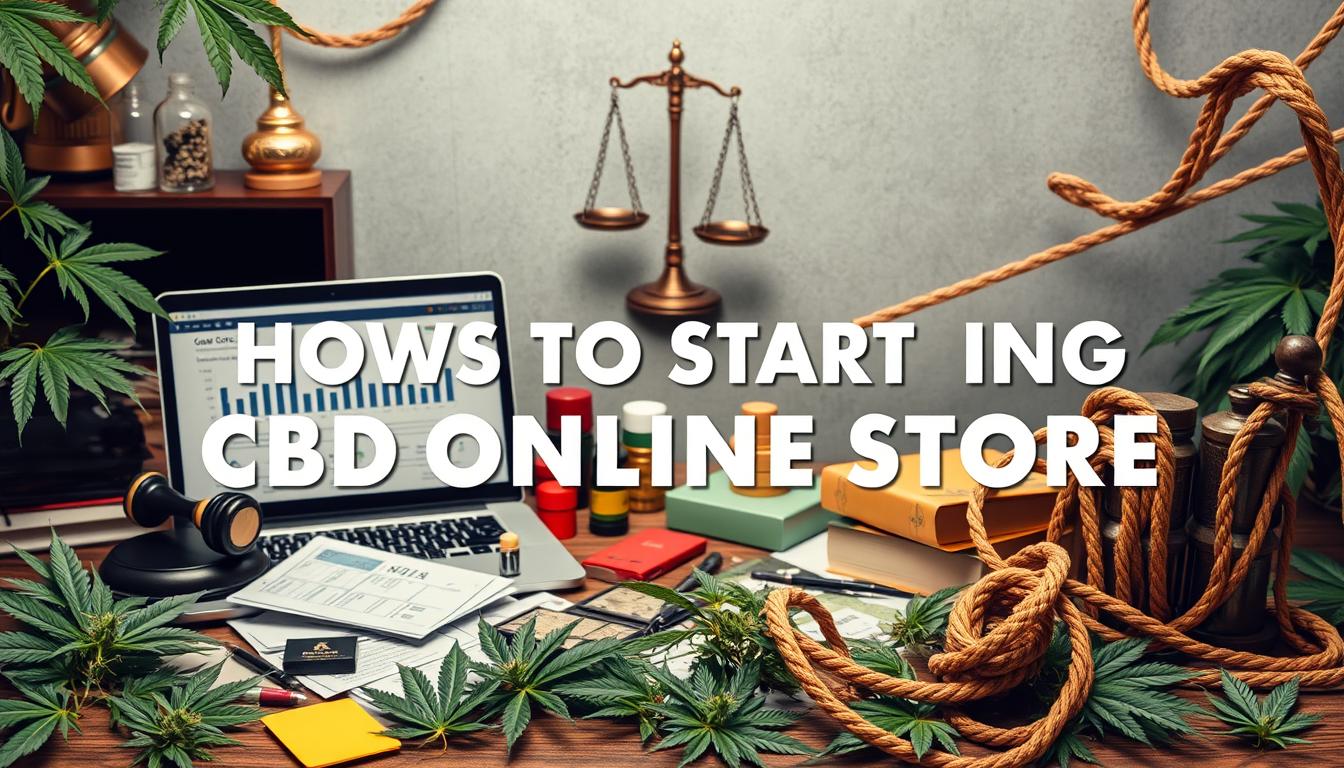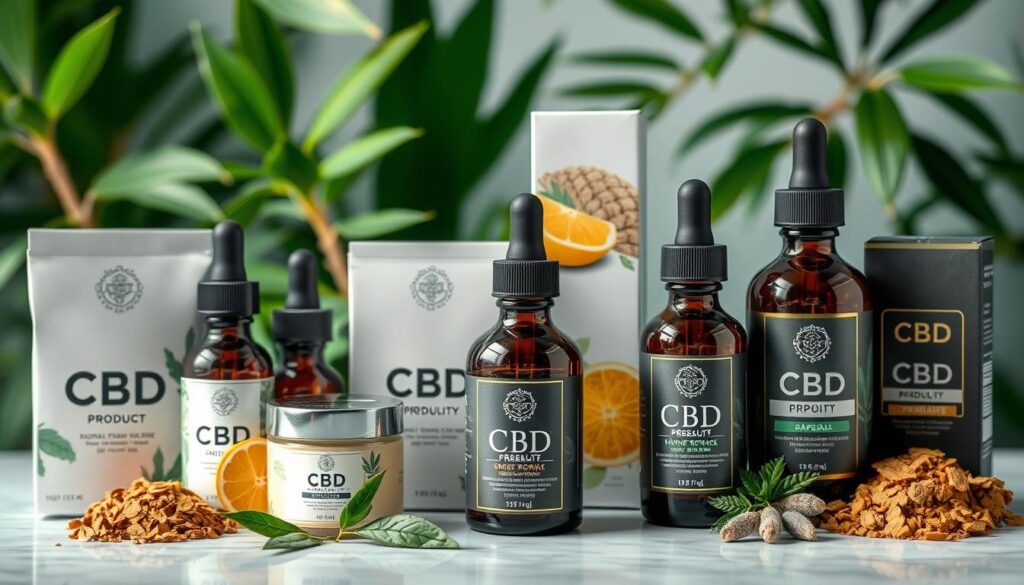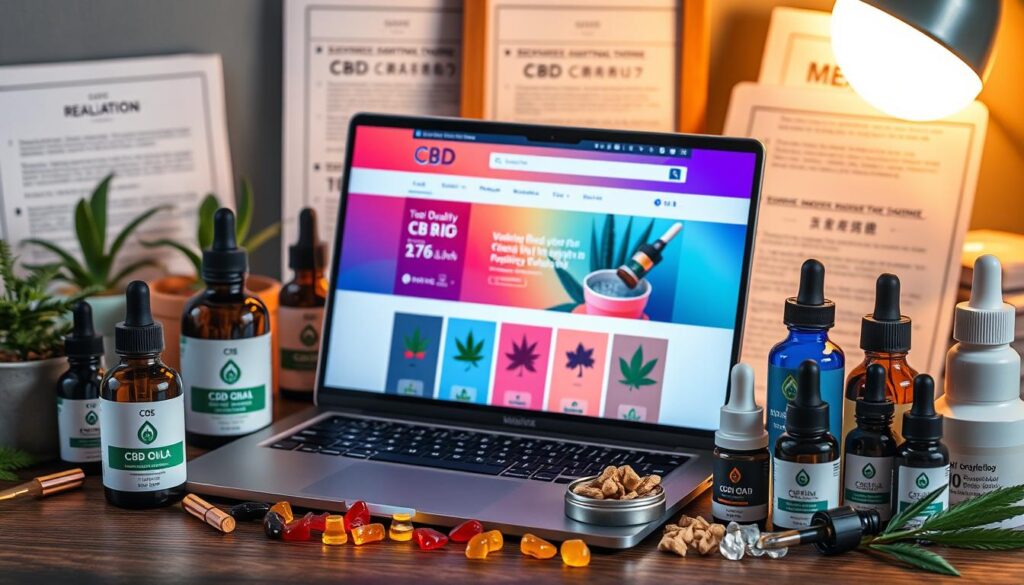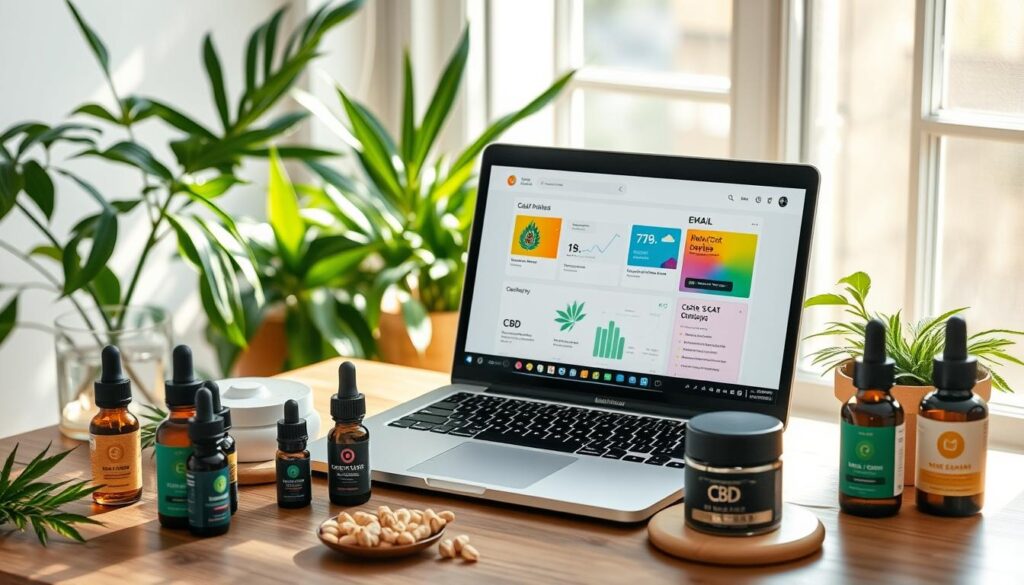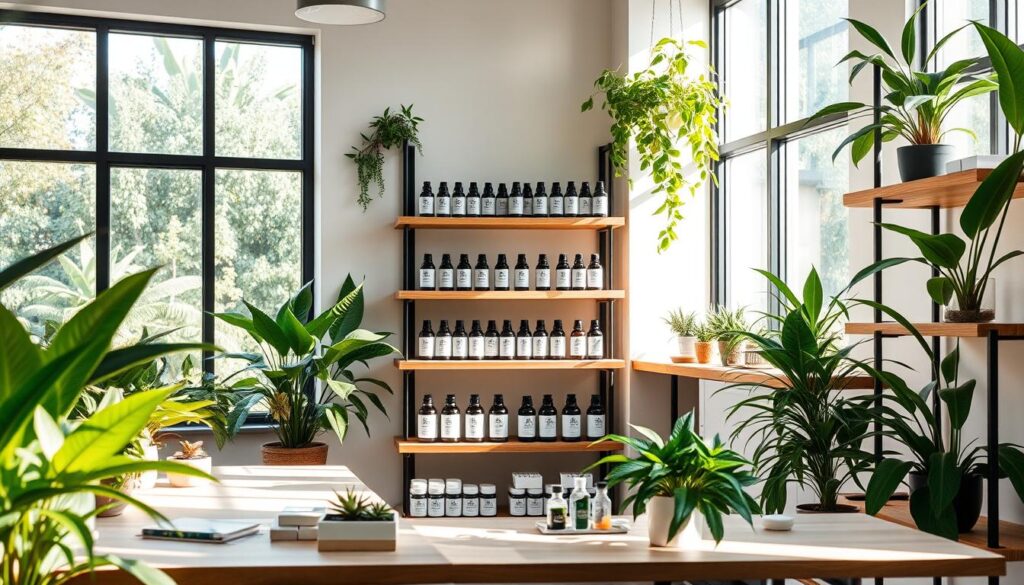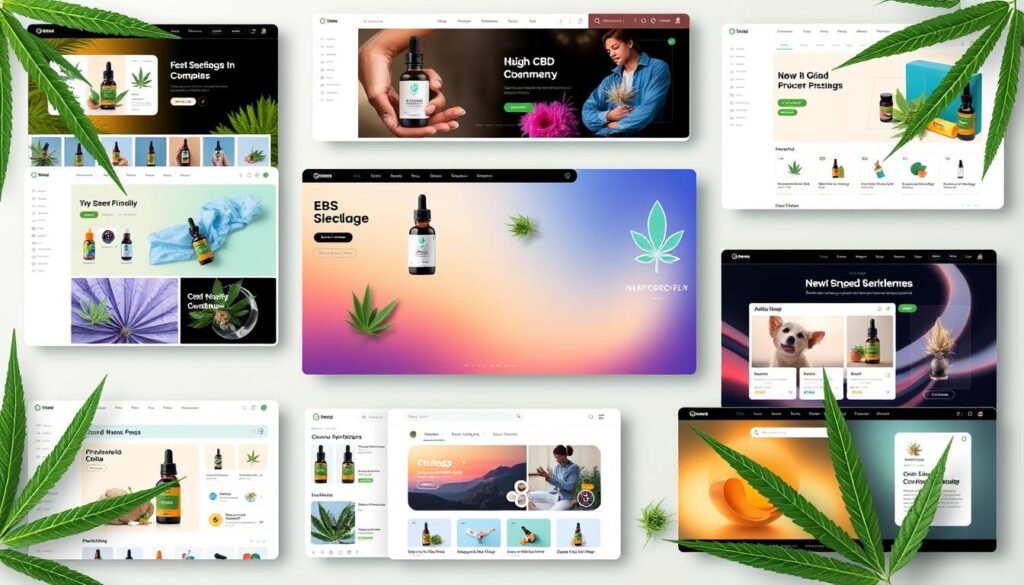Ever wondered why some CBD businesses do well while others struggle? Starting a CBD business is full of both big chances and tough challenges. The market is growing fast, from $600 million in 2018 to a predicted $22 billion by 2022. But, getting into this market needs careful planning and a deep understanding of the obstacles.
The rise in CBD’s popularity brings its own set of challenges. You’ll face complex legal rules and public doubts. Success isn’t just about making money. It also depends on smart business moves.
The COVID-19 pandemic has made people look for natural health products more. This has led to a big increase in online CBD sales in 2020. With online sales expected to hit $6 billion by 2026, having a strong online presence is key.
But, every CBD business owner must deal with legal issues, quality control, and educating customers. This complex world needs a detailed plan, combining knowledge, flexibility, and watchfulness. For more on these challenges and tips, check out this article by Essentia Pura.
Navigating CBD Regulations and Legal Compliance
Understanding CBD regulations and legal rules is tough but vital for CBD business owners. Knowing state and federal laws well helps avoid problems and keeps operations smooth.
Understanding State and Federal Laws
The 2018 Farm Bill made growing hemp with THC under 0.3% legal. But, selling CBD is still tricky. Federal laws set a base, but states like California, Texas, and Florida have their own rules. For example, California’s AB 45 requires strict testing and clear labels for CBD products. Texas, on the other hand, has easier rules for some hemp-derived CBD items.
“Following both state and federal laws is crucial for a CBD business to succeed. The different rules in states mean working closely with legal experts is essential.”
Novel Food Approval and Other Legal Considerations
CBD products also face challenges like getting novel food approval in the EU. This needs a lot of paperwork and money. In the US, the FDA said in January 2023 it won’t make rules for CBD in food and supplements. This leaves businesses unsure. Staying compliant ensures products meet quality and legal standards, avoiding big problems.
Learn more about CBD’s legal and regulatory challenges
Ensuring Transparent Labeling and Packaging
Clear labeling is key, as the FDA and FTC watch for false ads and unfair practices. California’s AB 45 demands specific warnings and a link to test results. The FDCA requires detailed nutrient testing and failing to do so can lead to lawsuits or actions.
- Labeling rules: AB 45 requires certain warnings and a link to test results.
- Testing standards: AB 45 and FDCA set strict tests for purity, strength, and contaminants.
- Compliance and lawsuits: Not following AB 45 or FDCA can put businesses at risk of legal trouble.
By making sure labels and packaging are clear, CBD businesses can gain trust and stay competitive. Staying on top of CBD regulations is vital for success in this fast-changing field.
CBD Challenges: Public Perception and Stigma
The CBD industry faces a big challenge: changing how people see CBD. Many still think it’s bad because it comes from the cannabis plant. We need to clear up these wrong ideas and teach people the truth.
Educating Consumers about CBD
Teaching people about CBD is a big job. We need to show it’s different from THC. This is key to fixing wrong ideas and making sure people know it’s safe.
A survey showed that almost 68% of US adults mix up CBD with marijuana. We must tell them CBD is safe and has health benefits.
“Education initiatives must focus on the non-psychoactive nature of CBD and its potential therapeutic applications to build consumer trust and acceptance.”
Good education can calm fears about CBD. It’s important to share clear, true facts. This helps people understand the difference between CBD and THC.
Addressing Misconceptions about CBD and THC
People often get CBD and THC mixed up. This makes it hard for them to accept CBD. A survey showed many people face disapproval from friends, family, and doctors.
| Participant Group | Perceived Approval | Comfort Level |
|---|---|---|
| Friends | 82.7% | 81.3% |
| Family | 75.3% | 76.9% |
| Medical Professionals | 37.8% | 61.3% |
| Society at Large | 32.9% | 57.1% |
To beat stigma, we must tackle the root of these wrong ideas. By spreading the word about CBD’s benefits and safety, we can change how people see it. Highlighting its safety and effectiveness can help a lot.
Securing Reliable Payment Processing Solutions
CBD businesses face a big challenge in finding reliable payment solutions. The industry is seen as high-risk, like marijuana, so banks are wary. This pushes CBD companies to look for specialized payment processors. These options are available but need to be checked for reliability and compliance.
High-Risk Payment Processors
Big names like PayPal and Stripe avoid CBD transactions. They say it’s too risky. So, CBD companies turn to specialized processors like Square, Clearent, and Paybotic:
- Square: Square has a CBD Program with specific fees. In-person transactions cost 3.5% + 10¢, and online ones are 4.4% + 15¢.
- Clearent: Clearent offers a wide range of services. This includes eCommerce, mobile, and in-app payments.
- Paybotic: Paybotic is known for affordable options. They support debit, eCheck/ACH, and have quick setup, making transactions smooth.
Handling Financial Transactions Legally
CBD companies must follow strict rules for financial transactions. They need to stick to laws and banking rules. Using ACH payment processing helps control refunds and lowers fraud risks. Adding live validation tech also helps avoid payment problems.
But, relying only on P2P mobile payments is risky. These platforms can cancel accounts, freeze funds, and have security issues. They lack the scale and image CBD businesses need, causing problems and hurting reputation.
In summary, while banks are hesitant to work with CBD, the right high-risk payment processors can help. They make financial transactions secure, compliant, and efficient.
Maintaining CBD Product Quality and Safety
The CBD market is growing fast, and keeping products safe and high-quality is key. This ensures trust from customers and follows the rules. The market was worth $18 billion in 2022, showing its big impact. We’ll look at how to keep CBD products top-notch, from choosing good hemp to strict testing and quality checks.
Sourcing High-Quality Hemp
Starting with good hemp is vital for quality CBD products. Hemp farming faces challenges like soil quality and pests. It’s important to work with farmers who use organic methods and avoid harmful chemicals.
A study showed 22 out of 25 hemp oil products didn’t match their CBD claims. The FDA has sent over 100 warnings about CBD product quality. So, finding reliable hemp sources is crucial. This helps build a strong supply chain that ensures product purity and consistency.
Testing and Quality Control Standards
The extraction process must be carefully managed. This ensures the CBD has THC levels under 0.3 percent. This meets legal standards and makes customers feel safe and confident in the product’s effectiveness.
In places like Canada, products must pass strict tests. These tests check for accurate cannabinoid levels, no contaminants, and no harmful substances. This makes regulated CBD products more trustworthy than unregulated ones.
Research in Nature found that consistent CBD products can reduce anxiety by 60% to 70% in four weeks. This shows how important research is in making good CBD products. Following strict quality control and third-party testing ensures products are safe and work well, just like medicines and food.
Following these quality control steps is essential for a CBD business to be seen as credible. Reliable testing lets companies confidently sell their products, showing they care about quality and safety. For more info on making your online CBD business better, visit this link.
Effective Marketing Strategies Amid Restrictions
The CBD market is growing fast, expected to hit over $20 billion by 2024. For any CBD online business, it’s key to know the marketing rules. To use social media and content marketing well, you need to be both creative and follow the rules closely.
Leveraging Social Media and Content Marketing
Even with limits on ads on Google and Twitter, social media is still a great way to connect with people. Sites like Facebook and Instagram let some CBD ads through. You can share educational videos, keep people updated on CBD’s benefits, and work with influencers.
Also, making blog posts that answer common CBD questions can help more people find your site. This can also improve your site’s ranking on search engines.
Complying With Advertising Regulations
It’s important to follow the rules to avoid legal trouble. The FDA says you can’t make health claims about CBD without proof. So, focus on the wellness benefits of CBD without saying it cures anything.
Make sure your labels are clear and your product info is accurate. This builds trust with your customers. Newsletters with reviews, deals, and educational content can also keep customers coming back while staying within the law.
In short, to succeed in the CBD market, you need a smart plan that’s both creative and follows the rules. By using social media and content marketing wisely, and sticking to the rules, CBD businesses can grow and reach more people.
FAQ
What are the top 5 challenges when starting a CBD online store?
How do we navigate CBD regulations and ensure legal compliance?
Why is transparent labeling and packaging important in the CBD industry?
How can we address public perception and stigma around CBD?
What should we consider for financial transactions and payment processing?
How do we ensure the quality and safety of our CBD products?
What are the most effective marketing strategies amid CBD advertising restrictions?
Source Links
- https://www.bigcommerce.com/articles/selling-cbd-online/
- https://specright.com/blog/cbd-supply-chain-challenges
- https://www.digitalauthority.me/resources/cbd-marketing/
- https://www.legitscript.com/cbd-cannabis/navigating-cbd-regulations-in-the-us-key-takeaways-from-our-webinar/
- https://www.quinnemanuel.com/the-firm/publications/navigating-cbd-labeling-litigation-risk-under-california-and-federal-law/
- https://www.linkedin.com/pulse/navigating-legal-regulatory-challenges-cbd-e-commerce-ather-farooq-jnhae
- https://pmc.ncbi.nlm.nih.gov/articles/PMC9223559/
- https://harmreductionjournal.biomedcentral.com/articles/10.1186/s12954-024-01051-5
- https://edebitdirect.com/navigating-payment-processing-challenges-in-the-cbd-cannabis-industry/
- https://koronapos.com/blog/cbd-payment-processing/
- https://www.aamc.org/news/cbd-does-it-work-it-safe-it-legal
- https://www.ncbi.nlm.nih.gov/pmc/articles/PMC10249738/
- https://designstallion.com/blog/cbd-marketing-strategies/
- https://www.bigeyeagency.com/marketing-strategies-for-your-cbd-product/
